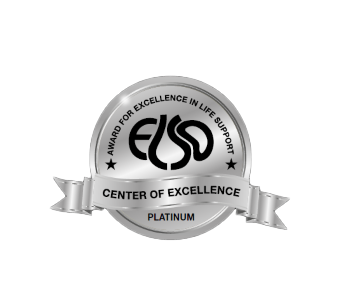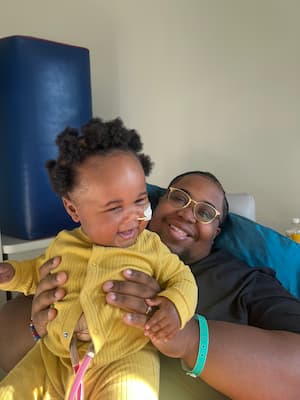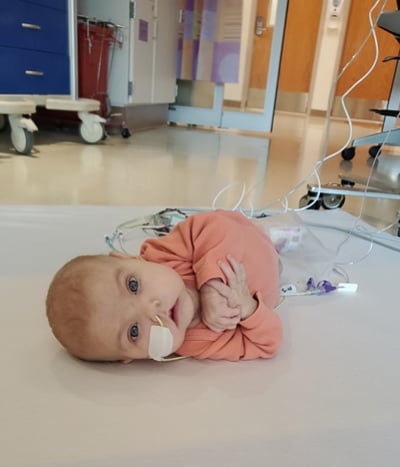Extracorporeal Membrane Oxygenation (ECMO) Program
When your child is in intensive care, the experience can be overwhelming. But through it all, our expert medical team will be by your side to explain everything that's happening, answer your questions, and most of all, provide the very best possible care for your child during this critical time.
ECMO – Supporting Heart and Lung Function
ECMO is a treatment used for children with life-threatening heart and/or lung problems. It provides long-term heart and/or lung support when standard treatments are failing. ECMO is the highest level of life support offered.
Children’s Mercy provides the highest level of ECMO care
The ECMO program at Children’s Mercy has been awarded the Excellence in Life Support – Platinum Level – by the Extracorporeal Life Support Organization (ELSO). This is the highest distinction an ECMO center can receive and means that we provide exceptional quality of care to children.

The highly regarded Platinum Level designation demonstrates the Children’s Mercy ECMO program has:
- High quality standards and processes in place.
- Specialized equipment and supplies.
- Carefully defined patient protocols.
- Advanced education for all team members, including high-fidelity simulations.
Our ECMO survival rates frequently exceed national averages. For more information about our outcomes, please contact us at ECMODirectors@cmh.edu.
Platinum Center
of Excellence
Designation from ELSO
Regional Leader
in Diagnoses,
Outcomes and Volumes
Better Survival Rate
16% Higher than
National Average
A High-Volume
Program
More than 1,100
children have been treated
What to Expect
Patients who are on ECMO support are typically already established patients in our Neonatal Intensive Care Unit (NICU), Pediatric Intensive Care Unit (PICU), or Cardiac Intensive Care Unit (CICU). Children who are on ECMO have underlying illnesses we are trying to treat.
Often, children who are being treated at other hospitals and need this higher level of life support arrive here by Children’s Mercy Critical Care Transport (airplane, ambulance, helicopter, etc.). Sometimes, these patients end up going on ECMO while others begin to improve with higher levels of support at Children’s Mercy. Overall, the ECMO program supports around 50 to 60 children per year on ECMO life support.
Conditions
ECMO can help children with a variety of life-threatening heart and/or lung problems. Learn more about the conditions we treat with ECMO.
For health care providers
When to call
-
Oxygenation index ≥20 for ≥12 hours (Mean airway pressure x FiO2/PaO2).
-
Two or more vasoactive infusions with doses ≥0.1 mcg/kg/min.
-
OR anytime concerned to ensure a timely and safe transport.
Connect with us
If you are a health care professional and would like to connect about services from Children’s Mercy, please send us an email at ECMODirectors@cmh.edu. We are happy to discuss our program, expertise, transport capabilities, outcomes and more. We care for children from all parts of Missouri and Kansas, as well as surrounding states.
Persistent Pulmonary Hypertension of the Newborn (PPHN): Isaac’s Story
Isaac was born in Wichita with multiple challenges, including an enlarged heart and persistent pulmonary hypertension of the newborn (PPHN). Critical Care Transport, ECMO and NICU teams collaborated to get Isaac to Children’s Mercy quickly to save his life.

Myocarditis: Cartier’s Story
Cartier had a severe form of myocarditis, inflammation of the heart muscle. Through the support of his family and a large multidisciplinary care team, he made a full recovery — no transplant needed!

Inside Pediatrics: Zei's story
After a mysterious illness ravages Zei’s lungs and leaves her fighting for life, the critical care team re-invents its life support protocols to push the limits of medicine to give her a chance.
CM celebrates its 50th heart transplant: Wrenley's Story
New heart, new normal! The nine-month-old is teething, growing and infinitely curious about the world around her. Wrenley is thriving with her new heart. All thanks to the hard working staff at Children's Mercy.
